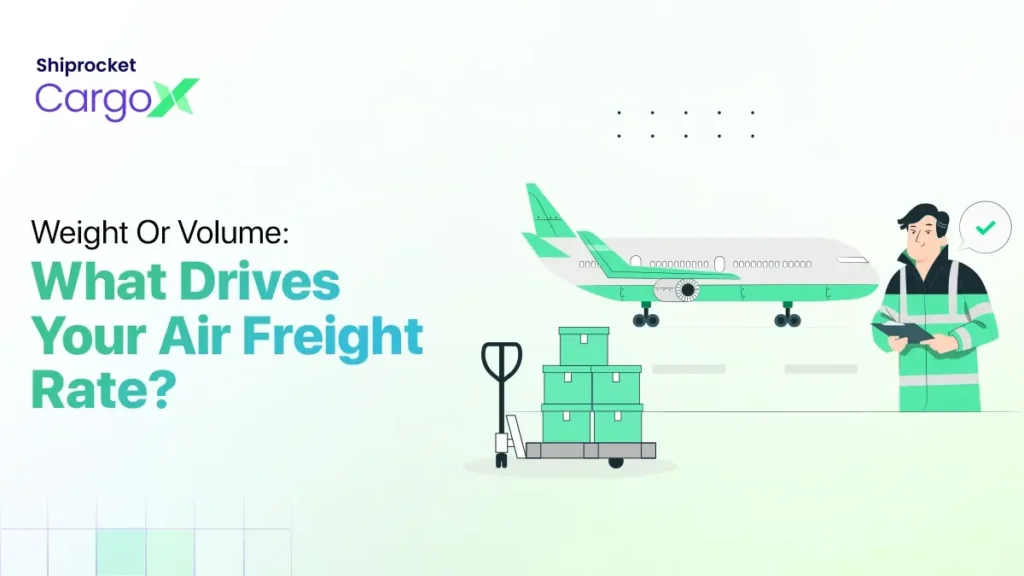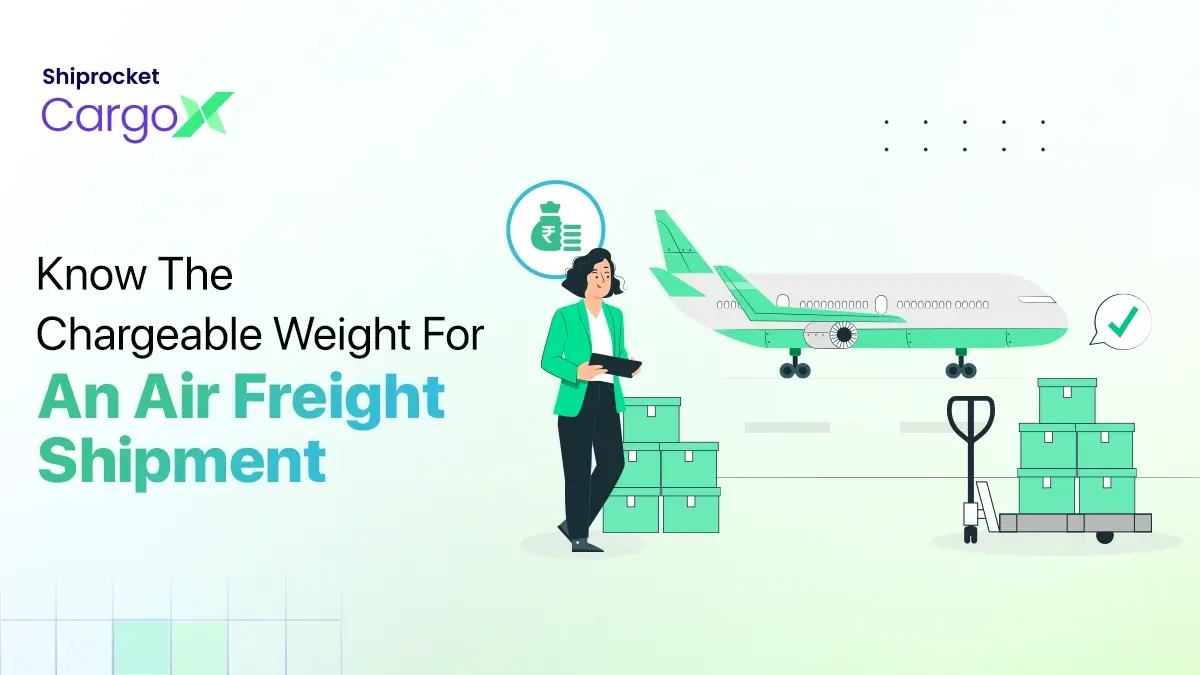Air Freight Rates: How Are They Calculated?
The shipping industry is growing and developing rapidly. It facilitates the movement of goods through road, rail, air, and maritime transport. The global economy of today depends heavily on the shipping industry. After all, the smooth flow of commodities from one nation to another is essential to the operation of an international trade-based economy.
Owing to the developments in air transportation, we can now ship goods swiftly and securely through air routes. Air transportation has several advantages compared to other modes of transport in terms of speed, reliability, and security. However, the charges it imposes for its superior services are accordingly high. Air freight rates generally range from USD 1.50 to USD 4.50 per kilogram. Do you know what factors affect the air shipping charges? Is it an affordable option for all types of businesses? Does it suit the needs of all businesses? It is vital to understand everything about the suitability of freight shipping, its rates and methods to minimise these charges. It will allow you to plan your resources accordingly to ensure that you do not go over your budget.
This article details all there is to know about air freight rates, factors that influence them, methods to calculate the freight rate, and different trends seen in recent times in the air freight logistics industry.

Factors Influencing The Calculation of Air Freight Charges
Here are the major factors influencing the calculation of air freight rates:
1. Dimension and Weight
The weight and dimension of your shipment are some of the most important factors influencing the cost of your air freight. The bigger the shipment, the more the weight and dimension. Such consignments will take up more room in the aircraft and this will increase the freight rate. Plus, the weight and dimension also influence how many people will be needed to handle your goods. All these factors will directly add up to your total costs. One of the best ways to mitigate air freight costs is to ensure that you don’t overpack your goods.
2. Freight Route and Distance to be Covered
Distance is another factor directly influencing air freight charges. However, it’s not just the distance between the location of origin and destination that impacts these charges. The route through which the goods will be transported also determines the rate. Longer transport routes mean more fuel consumption, which translates into higher fuel costs for the airlines. This increases the overall air freight rates. As a general rule of thumb, popular routes that have high traffic and competition will be cheaper. On the other hand, less common routes will be more expensive. Moreover, busy international hubs will charge you higher fees.
3. Add-on Services Opted
If you opt for additional services, you’ll have to pay additional charges to ship your goods. Once the shipment booking is completed, these charges will be added to your original air freight bill. There are different types of additional charges levied by the airlines. These include fees for inside delivery, limited access locations, quick or guaranteed services, and pickup or delivery to residential locations.
4. Season and Market Demand
Supply and market demand are also primary factors that determine air freight charges. So, how does it work? During peak seasons with high demand, companies will compete for more space. This increases air freight charges significantly. However, during the months with low demand, the air freight charges will also be low. It’s not just seasonal trends that will influence the freight charges, sometimes weather disruptions can constrain the capacity of the cargo, raising the air cargo shipping costs.
Though these are the major factors that influence air freight rates, it’s not an exhaustive list. Several other factors could directly influence your air freight charges. Some of them are supply chain disruptions, fuel prices, the type of goods you’re shipping, the complexity of delivery, geographic location of destination, aircraft capacity, and more.
Express and International Air Freight Rates
Express freight shipments and international air freight are different from each other. Here’s how:
Express air freight is generally handled by a single company. This company takes care of the complete shipment lifecycle. They also manage door-to-door deliveries. On the other hand, international air freight tends to move across several carriers during transit. International air freight shipments are also significantly larger, while express air freight shipments are comparatively smaller.
What’s important to note here is the fact that several factors will influence the rates of international air cargo. These include the cargo being shipped, capacity, and demand. Moreover, all the factors listed above are not to be forgotten while calculating the charges for sending shipments via air.
Air Freight Charge Calculation Using Volumetric and Actual Weight
The weight of the shipments can be an influencing factor while shipping parcels through air. The weights that can be chargeable are gross weight (actual weight) or volumetric weight (dimensional weight). Of the two, the larger will be used to calculate the overall cost of air freight. The estimated weight is completely dependent on the dimensions of the parcel namely length, width, and height. Generally, larger parcels that are light in weight take up more room on the aeroplane than smaller and heavier items. Hence, the chargeable weight is the weight that is higher between the volumetric weight and the gross weight.
Formula of Actual Weight:
Actual weight = Product weight (kg) + Packing weight/ Pallet weight (kg)
Formula of Volumetric Weight:
Volumetric weight = (Length x width x height) / 6000
Air Freight Calculator
Many logistics partners now provide a virtual calculator on their website for sellers to determine the price of shipping their consignment using air freight services. This tool is rather simple to use. You will be required to add in the physical dimensions and weight of your consignment. The calculator calculates the volumetric weight and compares it with the good’s actual weight to determine the charges. Finally, the calculator will display a rate that would be an approximation of the costs that you might incur while shipping your parcel. It also incorporates taxes and other charges that are levied for your shipment.
Recent Trends in International Air Freight Rates
January 2024 saw a 10% year-over-year increase in air freight volumes, but because of the availability of capacity, this hasn’t translated into increased rates. January’s greater air cargo volumes are probably partly attributable to shippers, particularly in the garment and manufacturing components industry, switching from ocean to air transport to move products on time for the Lunar New Year.
As belly capacity continues to re-enter the market, it is anticipated that air freight costs will continue to fall in comparison to 2023 levels. Global general air cargo spot rates fell -12% month over month in January 2024 to an average of USD 2.27 per kg. This was following the global dynamic load factor’s trend, which saw it fall 3% points to 56% in January 2024 compared to December 2023. It’s still quite hard to predict the market. We have to wait and watch what happens in February when we might witness a decline in air and ocean volumes as well as rates if the market stabilises more.
Conclusion
Businesses across the world have begun using air freight as a quicker and more secure method of transportation. It has numerous advantages and has made it possible for eCommerce businesses to open up their markets in places untouched. However, shipping your parcels through airways is not as simple as it looks. The cost becomes a primary concern for shipping through air route and understanding the factors that influence the price of air cargo shipping is crucial for you to plan your transportation methods. From distance, location, weight, demand, and services opted, there is a delicate balance that can be struck to keep your shipping costs as minimal as possible. Understanding how you can keep your logistics costs in line is crucial for making profits in your business. You can rely on a trustworthy logistics service provider like Shiprocket’s CargoX to transport your heavy and bulk goods across borders using air freight. They provide instant quotes and have no hidden fees.
There are three main benefits of air freight, which include speed of delivery, reliability, and security of the shipment.
Yes, both distance and chargeable weight will impact your air freight charges. The heavier or bulkier your shipment, the higher the charges. Similarly, the longer the distance you ship to, the higher the air freight charges.
One situation in which you shouldn’t ship via air transport is when price is your major concern since it’s more expensive compared to other modes of transportation. It’s not suitable to transport many goods since the per unit cost will increase for large shipments. If you’re sending goods to a remote location, you may want to consider alternate transportation, especially when lead time is not the priority.
There are several types of goods you can transport by air cargo shipping. These include luxury products, time-sensitive goods, perishable items, fashion or high-value items, pharmaceutical and medical supplies, and other heavy and bulky goods.




